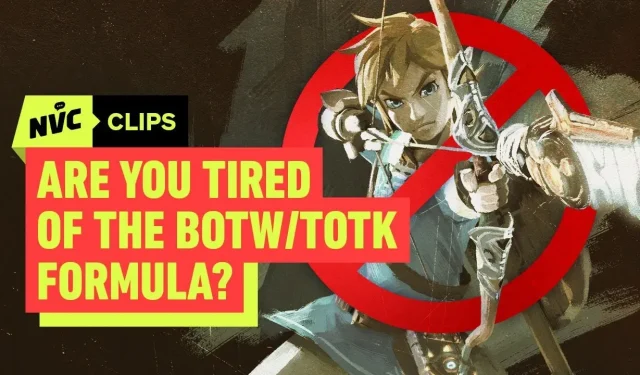The Legend of Zelda series has long been lauded for its innovative gameplay and immersive open-world experiences. After the remarkable successes of both Breath of the Wild and its sequel, Tears of the Kingdom, fans are left pondering whether the series has reached a creative crossroad. In a recent discussion hosted by IGN’s Logan Plant, Jada Griffin, Rebekah Valentine, and Brian Altano, the panel delves into the potential for evolution in the series. As they examine fan fatigue with the “Breath of the Wild” formula, the conversation explores whether the series should revert to its classic dungeon-based gameplay or continue to expand on its open-world approach. This article will comprehensively explore these themes and the implications for future Zelda titles.
Fatigue with the Open-World Formula
After the groundbreaking experiences offered by both Breath of the Wild and Tears of the Kingdom, it’s understandable why some players might feel fatigued by the formula. Both games set a new benchmark for open-world design, allowing players unparalleled freedom in how they explore Hyrule. However, with the immense depth and openness of these worlds, some fans are beginning to yearn for the structured, puzzle-solving elements that characterized earlier Zelda games. This sentiment suggests a possible demand for a more focused gameplay experience that emphasizes classic design rather than sheer exploration.
Panelists highlighted the notion that returning to classic dungeon mechanics could reinvigorate the franchise. Traditionally, Zelda games featured intricate dungeons filled with unique puzzles, requiring critical thinking and strategic problem-solving. A return to these elements could provide a refreshing contrast to the vast wilderness of recent titles, offering fans a diverse experience that blends nostalgia with modern gaming expectations.
The Appeal of Classic Dungeon-Based Gameplay
The discussion also touches on the merits of classic dungeon-based gameplay. Proponents argue that dungeons provide a structured framework that can enhance storytelling within the franchise. Each dungeon traditionally represents a new challenge, incorporating themes, enemies, and story elements that advance the game’s narrative. This could lead to a more cohesive plot and an elevated sense of accomplishment upon completion, elements that some players feel are lacking in the less structured open-world format.
Exploring this concept further, panelists pointed out that a hybrid approach might be the most beneficial for the series. By merging the exploratory nature of recent titles with the classic dungeoning experience, Nintendo could cater to both camps of fans—those who love the freedom of open-world exploration and those who long for the narrative focus of previous iterations.
The Future: Open-World Innovations or Classic Revival?
The conversation does not simply revolve around whether to abandon the open-world formula but rather how to innovate within it. Nintendo has a history of reinventing gameplay mechanics and evolving its series to keep them fresh. With the success of Tears of the Kingdom, there’s potential for further advancements in open-world design which could enrich gameplay elements without sacrificing core Zelda principles.
This raises important questions for the future of the franchise: Can Nintendo successfully marry classic gameplay with new innovations? Will the next 3D Zelda game on Switch 2 strive for balance, or will it boldly push the boundaries of open world exploration even further? As the panel suggests, the conversation must continue, and input from the community will be vital in shaping the future direction of the beloved series.
Conclusion
The discussion surrounding the future of The Legend of Zelda series is not just about nostalgia versus innovation; it is about understanding what players want from one of the most iconic franchises in gaming history. As fans look back at the series’ rich history, they are also eager to witness the next chapter unfold. Should Nintendo choose to return to its roots and embrace classic dungeon mechanics, or continue to expand the open-world formula? The debate is vibrant, and as we await official announcements, one thing is clear: the heart of the Zelda series beats strongest when it evolves while honoring its past.
https://www.youtube.com/watch?v=dNUclhy1Mgw


